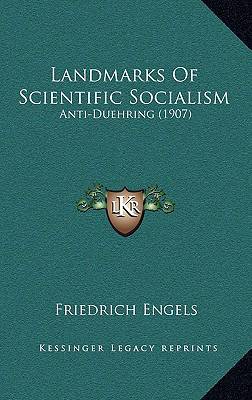
- Afhalen na 1 uur in een winkel met voorraad
- Gratis thuislevering in België vanaf € 30
- Ruim aanbod met 7 miljoen producten
- Afhalen na 1 uur in een winkel met voorraad
- Gratis thuislevering in België vanaf € 30
- Ruim aanbod met 7 miljoen producten
Zoeken
€ 60,95
+ 121 punten
Uitvoering
Omschrijving
Landmarks of Scientific Socialism: Anti-Duehring is a book written by Friedrich Engels and published in 1907. The book is a critique of the work of Eugen Duehring, a German philosopher who was influential in the socialist movement in the late 19th century. Engels' critique is a comprehensive analysis of Duehring's ideas and their implications for socialism. The book is divided into three parts. The first part deals with Duehring's philosophy and its shortcomings. Engels argues that Duehring's ideas are inconsistent and lack scientific rigor. He also criticizes Duehring's rejection of dialectics, which Engels sees as a fundamental aspect of Marxist theory. The second part of the book focuses on economics and political theory. Engels argues that Duehring's ideas on economics are flawed and that his political theory is reactionary. He also critiques Duehring's views on the role of the state in society, arguing that they are inconsistent with socialist principles. The third part of the book deals with the history of socialism and the socialist movement. Engels provides a detailed analysis of the development of socialist thought and the various factions within the movement. He also discusses the role of individuals such as Karl Marx and Wilhelm Liebknecht in shaping socialist theory and practice. Overall, Landmarks of Scientific Socialism: Anti-Duehring is an important work in the history of socialist thought. It provides a comprehensive critique of Duehring's ideas and offers a detailed analysis of the development of socialist theory and practice. The book remains relevant today as a source of insight into the debates and controversies within the socialist movement.This scarce antiquarian book is a facsimile reprint of the old original and may contain some imperfections such as library marks and notations. Because we believe this work is culturally important, we have made it available as part of our commitment for protecting, preserving, and promoting the world's literature in affordable, high quality, modern editions, that are true to their original work.
Specificaties
Betrokkenen
- Auteur(s):
- Uitgeverij:
Inhoud
- Aantal bladzijden:
- 268
- Taal:
- Engels
Eigenschappen
- Productcode (EAN):
- 9781164305880
- Verschijningsdatum:
- 10/09/2010
- Uitvoering:
- Hardcover
- Formaat:
- Genaaid
- Afmetingen:
- 152 mm x 229 mm
- Gewicht:
- 562 g

Alleen bij Standaard Boekhandel
+ 121 punten op je klantenkaart van Standaard Boekhandel
Beoordelingen
We publiceren alleen reviews die voldoen aan de voorwaarden voor reviews. Bekijk onze voorwaarden voor reviews.











